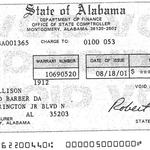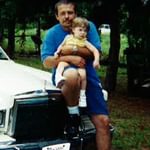Grants of Review with Summary Dispositions
Ovante v. Arizona, No. 22 – 7229
On October 2, 2023, the Supreme Court issued an order granting certiorari to Manuel Ovante Jr., vacating the judgment, and remanding the case for further consideration in light of its ruling in Cruz v. Arizona.
The petitioners raised the same claim as in Cruz (see DPIC’s summary), that when their prosecutors raised the issue of their future dangerousness during sentencing hearings, they had a due process right to inform jurors that they would not be parole eligible if they were sentenced to life, and that the state court had misapplied both Simmons v. South Carolina and Lynch v. Arizona in refusing to allow them to do so.
Notable Denials of Review

Johnson v. Alabama, No. 22 – 7337
On October 2, 2023, the Court denied certiorari to Toforest Johnson, who has long maintained his innocence. Mr. Johnson was convicted of the 1995 shooting of Deputy Sheriff William Hardy, despite over ten eyewitnesses placing Mr. Johnson across town at a nightclub at the time of the crime. The State’s case largely rested on the testimony of an “earwitness”: Violet Ellison approached police after the State put out a $5,000 reward offer for information on the case, and testified at trial that she overheard a three-way jail phone call in which a man referred to himself as “Toforest” and confessed to the crime. The State denied that Ms. Ellison received a reward for her testimony for almost two decades, until a retired employee from the District Attorney’s office told Mr. Johnson’s defense team about a set of “confidential reward files” in 2018. The State then disclosed a file containing a $5,000 check made out to Ms. Ellison in 2001, claiming it had been “misfiled.” Despite these facts, the lower courts declined to find a Brady violation, leading Mr. Johnson to ask the Supreme Court directly for Brady relief. Numerous Alabama legal officials support a new trial, including the current District Attorney, the original trial prosecutor, a former Chief Justice, and a former Attorney General. Three of the original jurors also believe they convicted the wrong man. “The Supreme Court only reviews a small fraction of the cases that come to it,” said Ty Alper, an attorney for Mr. Johnson. “While we wish they had chosen to take a closer look at Mr. Johnson’s case, we are looking forward to returning to the appeal we have pending in Jefferson County, where the District Attorney has already called for a new trial.”

Roberson v. Texas, No. 22 – 7546
The Court denied certiorari to Robert Roberson on October 2, 2023, in a high-profile innocence case. Mr. Roberson was convicted of killing his daughter, Nikki, based on the now-discredited scientific theory of “Shaken Baby Syndrome” (SBS). The theory held that a certain constellation of symptoms, including brain swelling and bleeding, could only occur through malicious shaking — in other words, any child who died of these symptoms had been murdered. Evidence now shows that numerous other medical conditions can cause the same symptoms, including pneumonia and accidental falls; Nikki experienced both in the days before her death. At least 32 caregivers convicted based on SBS have been exonerated, and even the doctor who proposed the condition has renounced it. Dr. Norman Guthkelch called for a review of SBS convictions in 2012, saying, “I am frankly quite disturbed that what I intended as a friendly suggestion for avoiding injury to children has become an excuse for imprisoning innocent people.” In his petition, Mr. Roberson asked the Court to consider whether a conviction violated due process when the entire causation theory of the crime was undermined by modern science and medicine, and when the habeas court ruled against the defendant based on outdated forensic theories. Physicians, scientists, federal judges, and innocence advocates joined in asking the Court to grant Mr. Roberson relief. “Robert Roberson is an innocent father who has languished on Texas’s death row for 20 years for a crime that never occurred and a conviction based on outdated and now refuted science,” said Gretchen Sims Sween, Mr. Roberson’s attorney. “Robert’s legal team has been considering remaining options, which now can and must be pursued in light of the U.S. Supreme Court’s decision today to turn away from this righteous case.”